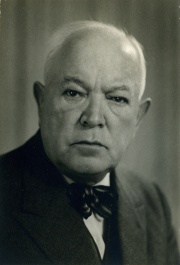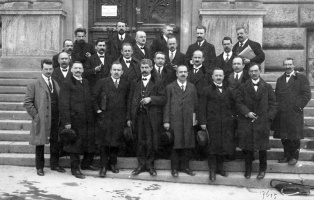Before the War↑
Grimm was the son of a textile workers’ family and joined the labour movement during his apprenticeship as a typesetter. His experience as a journeyman working in Germany, France, Austria and Italy and his thorough autodidactic studies of classical Marxism made him a staunch internationalist. Grimm also maintained good contacts among migrants in Switzerland. His first marriage in 1908 (divorced in 1916) to Rosa Reichesberg-Schlain (1875-1955), born in Odessa, further extended Grimm’s international network. After having been blacklisted as a strike-leader, he became a paid official of the labour movement and the leading figure of its younger, more radical generation. From 1906 to 1909, he worked as a local labour secretary in Basel. Thereafter, he became editor in chief of the Berner Tagwacht, the socialist daily newspaper of Switzerland’s capital. He was elected to the National Council (the larger chamber of the Swiss federal parliament) in 1911 and remained – with a short interruption in 1919/1920 – a member until 1955.
Grimm’s Activities during the War↑
Organiser of the Zimmerwald Movement↑
Grimm’s excellent international connections qualified him to become one of the key players in the attempts by socialists from the neutral countries to reconnect the international ties broken by the war. From 1907 on, Grimm participated in all congresses of the Second International and from 1912-1914, as well as in most meetings of the International Socialist Bureau, including its last pre-war meeting in Brussels (29-30 July 1914). In cooperation with the International Peace Bureau, he organised a German-French inter-parliamentarian conference in Bern in May 1913 with the aim to prevent the outbreak of a war between these two countries. This meeting also included non-socialists such as Paul d’Estournelles de Constant (1852-1924) and Conrad Haußmann (1857-1922)]. It was at this conference that August Bebel (1840-1913) and Jean Jaurès (1859-1914) met for the last time.
Grimm drafted the resolution of the first larger international socialist meeting after the outbreak of the war – the Italian-Swiss socialist conference at Lugano (27 September 1914). In his Berner Tagwacht, he published articles from the leaders of the socialist anti-war opposition. Bern and its surroundings hosted key meetings of this movement, beginning with the International Socialist Women and Youth conferences in spring 1915. In close collaboration with Angelica Balabanoff (1878-1965), Grimm was the main organiser of the Zimmerwald Conference, where he was elected as a chairman of the International Socialist Commission. This body attempted to coordinate socialist anti-war activities on the international level and organised a second conference in Kiental (April 1916). Grimm effectively resisted attempts of a group led by Karl Radek (1885-1939) and Vladimir Il’ich Lenin (1870-1924) (the so-called “Zimmerwald Left”) to use Zimmerwald to split the international labour movement. This explains the frequent malicious remarks on Grimm in Lenin’s writings from these years. After the Grimm-Hoffmann Affair, Grimm lost his leading role in the socialist anti-war opposition.
Leader of the Oltener Aktionskomitee (OAK) and the Landesstreik↑
Although he had at first accepted the special war-time powers granted to federal government, Grimm soon became the most influential leader of the protests against the social and economic consequences of the war and militaristic tendencies in neutral Switzerland. At the beginning of 1918, Grimm set up and chaired the Oltener Aktionskomitee. Provoked by a preventive military occupation of the main Swiss centres, the Committee called a protest strike on the 9 November 1918, which was followed by the Landesstreik (Switzerland). At the beginning of April 1919, a military tribunal sentenced Grimm to six months in prison for calling on soldiers to refuse orders to open fire on the strikers. During his detention between July 1919 and January 1920, Grimm wrote a book on the role of class struggle in the history of Switzerland.
After the War↑
After the war, Grimm was among the founders of the International Working Union of Socialist Parties (IWUSP) and thus took a “centrist” position between the remnants of the Second International and the so-called Third (communist) International, whose twenty-one conditions he rejected. After the merger of the IWUSP with the Second International into the Labour and Socialist International (LSI) in 1923 – a step he first opposed – he became a member of the LSI’s bureau from 1926 to 1940. From 1918 to 1938, Grimm worked as a member of the local government of the city of Bern, where he proved his talent for pragmatic policy-making. However, he remained the most-hated man of Switzerland’s hard right gathered around the Swiss Patriotic Federation. In a clear break from the customs of Swiss parliamentarism, he was not elected as a chairman of the National Council in 1926.
In view of the threat of fascist dictatorships, Grimm changed his hitherto negative stance towards national defence and a socialist participation in the federal government in the 1930s. As a member of the cantonal government of Bern between 1938 and 1946 and director of the power and heat section of the Swiss war economy during the Second World War, he held key government positions during that important period. However, even as a senior statesmen in the 1950s, he never abandoned his firm socialist convictions and his Marxist view of history and society. Both Grimm’s activities in Swiss domestic politics and the Zimmerwald movement are well researched. A more transnational view could further clarify how Grimm’s numerous activities on the international, national and local level were interconnected.
Adrian Zimmermann, Independent researcher
Section Editor: Roman Rossfeld
Selected Bibliography
- Degen, Bernard / Schäppi, Hans / Zimmermann, Adrian (eds.): Robert Grimm. Marxist, Kämpfer, Politiker, Zurich 2012: Chronos.
- Degen, Bernard: Theorie und Praxis des Generalstreiks, in: Degen, Bernard / Schäppi, Hans / Zimmermann, Adrian (eds.): Robert Grimm. Marxist, Kämpfer, Politiker, Zurich 2012: Chronos, pp. 51-62.
- Kirby, David G.: War, peace, and revolution. International socialism at the crossroads, 1914-1918, Aldershot 1986: Gower.
- McCarthy, Adolf: Robert Grimm. Der schweizerische Revolutionär, Bern 1989: Francke.
- Voigt, Christian: Robert Grimm. Kämpfer, Arbeiterführer, Parlamentarier. Eine politische Biographie, Bern 1980: Zytglogge.
- Zimmermann, Adrian: Robert Grimm, le mouvement ouvrier bernois et la mémoire contestée de la Conférence de Zimmerwald, in: Cahiers d'histoire du mouvement ouvrier 32, 2016, pp. 14-36.










